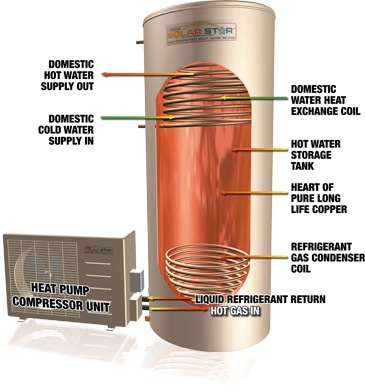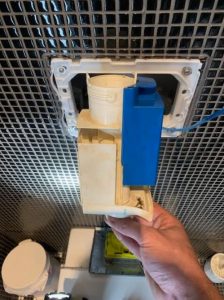As an experienced Australian plumber, I’ve got plenty of experience under my belt installing heat pump hot water systems. Sounds a bit tricky, doesn’t it? But, no worries, it’s actually a lot simpler than it seems.
Have you ever questioned if there’s a more efficient method to heat your water? Guess what, there is! These systems are not only good for the environment but also kind to your pocket. Imagine it as a fridge, but the other way around! Also see our article on instant and tankless sytsems.
Are you keen to discover more about this brilliant technology? Let’s get stuck in!
Points Of Note
- Heat pump hot water systems are available in integrated and split system configurations, with the integrated systems being heavier and the split systems having components in separate units.
- Heat losses can occur through the cylinder walls, so it is important to switch off the heat pump when not in use and consider off-peak electricity tariffs.
- The reheat rate of the system can be affected by ambient conditions and some systems have an electric boost element for low temperatures, which can increase running costs.
- Heat pump hot water systems can be more energy-efficient than electric storage systems and can be optimized with the use of timers and rooftop solar PV systems.
Understanding Heat Pump Hot Water Systems
The two common heat pump hot water systems I work with are, integrated and split systems, and I’ve found that understanding their differences is important to making an informed choice.
With an integrated system, the heat pump and water storage tank make one compact unit. The heat pump water heaters use the surrounding air, absorbing heat and transferring it to the water via a heat exchanger.
Split systems, on the other hand, separate the heat pump from the storage tank, connecting the two by pipes carrying refrigerant. Both boast impressive energy efficiency, but split systems might be slightly more complex to install.
My advice? Consider the available space, your hot water needs, and consult a professional before making a decision.
The Science Behind Heat Pump Hot Water Systems
Often, I find myself fascinated by the science behind heat pump hot water systems, as they regularly utilize the principles of thermodynamics and heat transfer to efficiently warm our water.
Here’s how heat pump systems work: they absorb heat from the surrounding air and transfer it to water stored in a tank. This process is part of the refrigeration cycle, similar to how your fridge cools food.
The refrigeration cycle in a heat pump hot water system absorbs heat from the environment, even on cold days, and transfers that heat to your water. This method of heating water is incredibly efficient, reducing the amount of energy needed to provide hot water for your home.
Truly, the science behind these systems is both intriguing and practical.
Diverse Types of Heat Pump Hot Water Systems
Before we dive into the diverse types of heat pump hot water systems, let’s remember that during our last discussion, we delved into the fascinating science behind these systems, and now, we’ll explore the various systems available on the market.
You’ve got integrated heat pump systems, where the heat pump water heater is mounted on top of the storage cylinder, containing all necessary components like the evaporator, fan, compressor, and condenser.
Alternatively, there are split systems. In this setup, the hot water heat pump is in a separate unit, connected to the storage cylinder by refrigerant piping.
When considering a new hot water system, it’s crucial to understand these differences, so you can make an informed decision about which type suits your needs best.

Image source: https://www.fallonsolutions.com.au/handy-hints/how_does_a_heat_pump_hat_water_system_work
Evaluating the Efficiency of Heat Pump Hot Water Systems
Let’s take a look at how we can evaluate the efficiency of heat pump hot water systems. Three key factors to consider are heat losses, reheat rates, and running costs.
It’s crucial to inspect heat losses during operation. A system with minimal heat loss is more energy efficient, reducing energy consumption.
Reheat rates indicate how quickly the system can heat water after depletion. Faster reheat rates contribute to overall efficiency.
Lastly, consider the running cost. A high-efficiency heat pump hot water system may have a higher upfront cost, but the reduced energy consumption can offset this over time.
Factors Affecting Heat Pump Hot Water System Performance
I’m eager to delve into the factors that play a crucial role in the performance of heat pump hot water systems. These factors range from ambient air temperature conditions to the size of the storage cylinder.
- Ambient Air Temperature: A heat pump system extracts heat from the surroundings to warm the water. Thus, the efficiency of the system depends on the ambient air temperature. Colder conditions might require more energy, increasing running costs.
- Size of Storage Cylinder: The size of the storage cylinder impacts the performance of the heat pump system. A larger cylinder can store more hot water but also needs more energy for heating, which can impact running costs.
- Insulation Quality: The insulation quality of the heat pump system is important for efficient performance. Efficient insulation reduces heat loss, resulting in consistent water heating and lower running costs.
Environmental Impact of Heat Pump Hot Water Systems
My next point of discussion is the environmental impact of heat pump hot water systems, and it’s an important one, given our planet’s current climate crisis.
Heat pumps are incredibly efficient, using less energy than traditional water heaters, reducing our reliance on fossil fuels. This leads to a significant decrease in greenhouse gas emissions, crucial in battling climate change. Furthermore, they can be powered with renewable energy, like solar or wind, further shrinking our carbon footprint.
It’s clear that the move towards heat pump hot water systems is a move towards a more sustainable future. However, it’s also essential to consider the manufacturing and disposal of these systems, as these too can affect our environment.
Cost Analysis: Heat Pump Hot Water Systems
- Initial Investment: The installation costs vary depending on the system’s size and complexity. You also need to factor in the cost of the heat pump hot water system itself.
- Operating Costs: These are ongoing costs, mainly your energy bills. A heat pump hot water system is more efficient, reducing these costs significantly.
- Government Incentives: Several programs can help offset initial costs, making the system more affordable.
Installation Process for Heat Pump Hot Water Systems
Before we dive into the specifics of installing a heat pump hot water system, it’s important to note that a professional should handle the installation, and it’s often included in the purchase price. The installation process for heat pump hot water systems can be complex, requiring technical knowledge and expertise.
Typically, the professional will first identify the best location for the system, considering factors such as space, access to electricity, and proximity to the water pipes. Once the spot is marked, they’ll set up the base for the water heater.
Following this, they’ll connect the separate unit, if there’s one, to the main system. Lastly, they’ll connect the system to your home’s plumbing and electrical circuits. Remember to test the system before the expert leaves.
Maintaining Your Heat Pump Hot Water System
I’m diligent about maintaining my heat pump hot water system, but I still schedule a professional check-up once a year. It’s crucial to understand how heat pumps work to ensure they operate efficiently.
- Cleaning the Air Filters: Like any device that uses air, heat pump systems can accumulate dust. I make sure to clean the air filters regularly.
- Checking the Anode Rod: This rod prevents corrosion in the water tank. I inspect it annually to avoid any damage.
- Reading Energy Rating Labels: These labels provide information about the system’s energy efficiency. I check them to ensure my system is working at its optimum level.
Maintaining your heat pump hot water system is key for its longevity and efficiency.
Troubleshooting Common Issues in Heat Pump Hot Water Systems
Let’s dive into troubleshooting common issues in heat pump hot water systems, which can often help you avoid an unnecessary service call.
Firstly, if your system isn’t heating water, it could be a tripped breaker or a faulty thermostat. Check the circuit breaker and reset it if needed. If the problem persists, you might need a new thermostat.
Secondly, if your system’s running constantly, it may be due to a leak or a faulty valve. Inspect for leaks and have valves replaced if necessary.
Lastly, compare the performance of your heat pump hot water system with other hot water systems. Remember, understanding how your hot water system works aids in effective troubleshooting.
Government Policies and Incentives for Heat Pump Hot Water Systems
I’ve noticed that there are several government policies and incentives for heat pump hot water systems which homeowners can benefit from. These incentives not only make it affordable to install these systems but also help homeowners save money in the long run.
Here are the top 3 incentives that I’ve come across:
- Renewable Heat Incentive (RHI): This government scheme provides quarterly cash payments over seven years to homeowners who install heat pump hot water systems.
- Energy Company Obligations (ECO): Under this policy, energy suppliers fund the installation of energy-efficient measures in homes, including heat pump hot water systems.
- Feed-In Tariffs (FITs): Homeowners with solar hot water systems can earn money for the electricity they generate and save on their energy bills.
Case Studies: Heat Pump Hot Water Systems in Use
Surprisingly, many homeowners are now using heat pump hot water systems, and they’ve found them to be highly efficient and cost-effective. These systems absorb heat from the surrounding air, requiring less energy than traditional water systems. Despite the higher upfront cost, the long-term savings on utility bills make it a wise investment.
I’ve read several case studies showcasing their benefits. One case study detailed a family that reduced their water heating bill by almost 60%. Another highlighted the system’s performance during winter, where it still functioned efficiently at low temperatures.
These systems also contribute to environmental sustainability by reducing carbon emissions. So, investing in a heat pump hot water system isn’t just about saving money, it’s also about making a greener choice.
Future Trends in Heat Pump Hot Water Systems
I’m expecting to see advancements in the efficiency of heat pump hot water systems as technology continues to evolve in the future. Here are three future trends in heat pump hot water systems I foresee:
- Integration with Solar Power: Heat pumps will increasingly be paired with solar hot water systems for maximum energy efficiency.
- Enhanced Split Systems: The split system air conditioner model will inspire enhancements in hot water pump design, increasing energy efficiency and user control.
- Advanced Heat Exchange Systems: We’ll see improvements in heat exchange system efficiency, reducing energy consumption even further.
These advancements will revolutionize electric hot water systems, making them more energy-efficient, cost-effective, and environmentally friendly. I can’t wait to see these changes materialize.
Selecting the Right Heat Pump Hot Water System for Your Home
Before we dive into the specifics of selecting the right heat pump hot water system for your home, it’s essential to note that your choice should depend on your household’s hot water needs and the climate you live in.
| Type of System | Advantages | Disadvantages |
|---|---|---|
| Storage Tank | Large capacity, cheaper upfront cost | Higher running costs, more space required |
| Solar Water Heater | Lower running costs, eco-friendly | Higher upfront cost, dependent on weather |
| Split System | Lower running costs, space-saving | Higher upfront cost, requires professional installation |
The storage tank provides a large amount of hot water but can be costly to run. Solar water heaters offer savings over time but rely on sunlight. Split systems are efficient but need installation by a professional. Your choice should balance cost, efficiency, and your home’s specific needs.
Commercial Applications of Heat Pump Hot Water Systems
I’m exploring the commercial applications of heat pump hot water systems, focusing on their benefits for businesses and potential drawbacks.
One major advantage is energy efficiency, as these systems use ambient heat, reducing reliance on electricity. This translates to lower operational costs, a crucial factor for businesses.
In commercial applications, these systems are often combined with a water storage tank. The heat pump extracts heat from the environment, effectively warming the water in the tank.
- Energy savings: Complements solar power, reducing utility costs further.
- Scalability: The integrated system can be sized to meet varying needs, from small businesses to larger facilities.
- Environmental impact: Lower carbon footprint compared to traditional heating methods.
However, they may be less effective in colder climates, a potential drawback to consider.
Comparing Heat Pump Hot Water Systems and Traditional Hot Water Systems
In comparing heat pump hot water systems and traditional hot water systems, it’s evident that my energy bill’s reduction is significant with the former, but the initial setup cost can be higher. When I integrated a heat pump with my solar panels, the savings were notable. For instance, split systems are beneficial as they work like an air conditioner, but in reverse, absorbing heat from the air to heat the water.
| Heat Pump Hot Water Systems | Traditional Hot Water Systems |
|---|---|
| Higher initial cost, but significant energy savings | Lower initial cost, but higher energy use |
| Works efficiently with solar panels | Typically uses a gas boosting system |
| Offers both integrated and split systems | Generally, doesn’t offer such variations |
The choice ultimately depends on your specific needs and resources.
Key Takeaways: Heat Pump Hot Water Systems
I’ve learned that a heat pump hot water system can significantly reduce energy costs, and while it may have a higher upfront cost, the long-term savings make it a worthwhile investment. This system works exceptionally well even in cold climates and cold weather.
Here are the key takeaways:
- Efficiency: The heat pump system extracts heat from the environment and uses it to warm up your water, making it far more efficient than traditional systems.
- Refrigerant Piping: The system uses refrigerant piping to transfer heat, ensuring a consistent supply of hot water.
- Long-term Savings: Despite a higher initial cost, the significant reduction in energy bills makes heat pumps a sound investment over time.
Popular Questions
What Are the Main Manufacturers of Heat Pump Hot Water Systems?
I’m familiar with several manufacturers of heat pump hot water systems. Some of the main ones include Rheem, Bosch, Stiebel Eltron, and A.O. Smith. Each offers various models with differing efficiency levels and capacities.
How Do Heat Pump Hot Water Systems Perform in Extreme Weather Conditions?
In extreme weather conditions, a heat pump hot water system’s efficiency can lessen. Cold temperatures slow the system’s ability to absorb heat, while extremely hot conditions can cause it to overwork. It’s important to consider local climate.
Can I Use a Heat Pump Hot Water System in a Multi-Story Building?
Yes, I can use a heat pump hot water system in a multi-story building. It’s crucial, however, to ensure proper installation and placement of the outdoor unit to maximize efficiency and performance.
How Does the Use of a Heat Pump Hot Water System Affect Home Insurance Costs?
As a homeowner, I’ve found that using a heat pump hot water system doesn’t significantly affect my insurance costs. It’s best to check with your insurance provider for specifics related to your individual policy.
Are There Any Possible Health Implications Associated With Using Heat Pump Hot Water Systems?
I’m not aware of any health implications tied to using heat pump hot water systems. They simply transfer heat to warm water, limiting energy use. They’re safe as long as they’re installed and maintained correctly.
Final Notes
So, there you have it! Heat pump hot water systems are an efficient, eco-friendly choice for heating your water. They come in various types, each with its own benefits.
The key is to understand your needs and pick the right system for your home. Don’t forget, their performance can be influenced by external factors like climate. Compare them to traditional systems, and you’ll see the difference.
Remember, every bit of energy saved counts!





